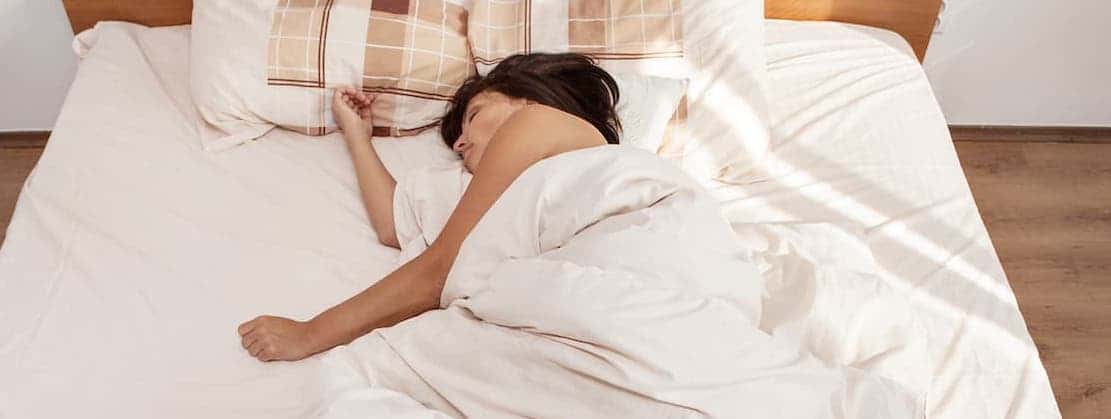Sleep is essential for our health and wellbeing, yet millions of us struggle to get enough of it and suffer as a result. Nuffield Health, the UK’s largest healthcare charity, found that 55% of people are not getting enough sleep.
If you’re not sleeping enough, the effects could be more significant than simply having bags under your eyes, with studies suggesting those who are sleep deprived report more negative feelings (sadness, anger or frustration for example).
The past two years have been immensely challenging. In times of uncertainty, many people will find sleeping well to be a challenge.
Our quality of sleep is affected by our emotional health, our nutrition, our physical health and fitness, and our general wellbeing.
A large number of studies have reported associations between impaired sleep and the likelihood of developing obesity or diseases such as type 2 diabetes.
Rather than being a cause/effect issue, studies suggest there is a link between sleep deprivation and hormone imbalance, leading to weight gain via over-eating. This is alongside lower mood and a reduction to physical activity due to increased feelings of fatigue.
Sleep deprivation has also been linked to potentially serious changes to emotion, mood states, and their regulation. What’s more, it could dramatically slow your response time and ability to make rational decisions, placing you and others in harm’s way.
You might feel the most immediate effects of poor sleep in the general demise of your ability to function effectively throughout the day. You might find it harder to concentrate, feel cranky, over-emotional or stressed.
To improve your sleep, Physiology National Lead at Nuffield Health, Louise Wright, provides some top tips on how you can get a good night’s sleep.
Sleep Environment:
· Turn off all lights
Light is one of the biggest factors affecting our sleeping patterns. That’s because our eyes have receptors that sense the light and communicate with the brain to tell us whether it’s day (awake) or night (sleep) time.
The blue light emitted from screens such as our phones or laptops is particularly harmful to sleep, because it is emitted at a different wavelength than natural light and suppresses the production of melatonin, a hormone that makes you sleepy, more than any other wavelength of light. So, exposure to blue light should be limited before sleep.
· Control your room temperature
Bedroom temperature changes generally have a slower and more progressive impact on the body, so the impact this has on sleep is harder to quantify but can still be a significant factor in poor sleep quality.
A cool room helps to reduce the body temperature prior to sleep, which helps initiate the sleep process. So, make sure your room is kept fairly cool – around 19˚C.
· Limit the noise
Excessive noise is a cause of sleep disorders and is potentially the most important factor contributing to a poor bedroom environment. However, noise can work to either disturb or soothe your sleep.
Alarms going off outside, or the hum from your heating, for example, can be disruptive due to the change in noise consistency (i.e. from soft to loud) and can become irritating, while ‘true’ white noise and some types of music have been found to aid sleep by blocking out distracting sounds and reducing the level of stimulus that sudden sounds have on the brain in the night.
Not all current literature is in agreement that white noise is beneficial to improving sleep quality, however, so it should only be considered on an individual basis.
Sleep Habits:
· Follow a schedule all week
“Sleeping in” on weekends makes it harder to wake up early on Monday morning because it re-sets your sleep cycles for a later awakening.
Try instead going to bed at a set time each night and setting your alarm for the same time each morning. This has the added bonus of giving you extra time to be productive at the weekend.
· Exercise daily
Regular exercise is likely to improve sleep quality. Try to exercise for 20 to 30 minutes every day, making movement a part of your daily routine, to help the body enter the physically restorative phase of sleep more easily.
When you exercise is equally as important because exercise can cause a spike in adrenaline, which keeps your body in an alert state so it can be recommended to avoid high-intensity exercise in the hours leading up to your bedtime.
· Avoid caffeine, nicotine, and alcohol
These are all stimulants that can increase your blood pressure and heart rate, keeping you awake. Caffeine in particular can block the sleep-promoting chemical adenosine, so potentially taking the action to cut out caffeine could, in the long run, remove the desire for that mid-afternoon pick-me-up cappuccino.
· Unwind before bed
Taking a warm bath, reading, or meditation before you go to bed can make it easier to fall sleep. A warm bath just before bed can help you get to sleep.
It’s not the rise in body temperature, but the subsequent cooling down that tricks the body into thinking you have gone from daytime into night-time. This promotes a stronger sleep urge.
If you would like some more information on how to get a better night’s sleep, Nuffield Health has a free online sleep hub with helpful hints, tips and a sleep diary to help you see where you might be going wrong.
Visit the website: www.nuffieldhealth.com/sleep.
